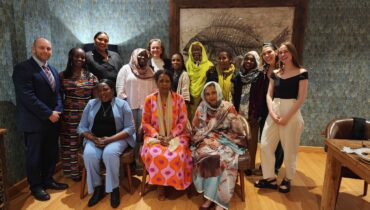The recent peace deal in Colombia brought the oldest ongoing armed conflict in the Americas to a close. But there are significant challenges in implementing the agreement, according to Ofelia Castillo and Sandra Bermudez, two Colombian women who participated in the peace process between the Colombian government and the Revolutionary Armed Forces of Colombia—People’s Army (FARC).
Castillo and Bermudez spoke at a Georgetown event sponsored by the Georgetown Conflict Resolution Program, in collaboration with GIWPS and the Center for Latin American Studies on April 17, 2018.
Bridging the Implementation Gap
For victims of violence and ethnic minorities, the road to peace is still unfinished, according to Castillo and Bermudez. This is especially true in the hard-to-reach areas of the country where the government is largely absent and guerilla groups maintain influence.
Bermudez cited several structural issues left unresolved or insufficiently addressed by the agreement, including development in rural spaces and ongoing influence of narcotrafficking. Bermudez argued for a joint effort to encourage a pivot away from reliance on coca production without the use of force. Bermudez’s own organizations, Corporación Viso Mutop and the Observatory of Crops and Growers Declared Illicit, work with small farming communities on these issues.
Castillo, who is the Director of Fundación Tierra Patria, also pointed to implementation gaps in terms of securing rights and reparations for victims, particularly those who survived sexual and gender-based violence. Tierra Patria is an organization comprised of Afro-Colombian mothers, and Castillo pointed out that Afro-Colombians, as well indigenous groups, have been acutely impacted by the armed conflict over the years. Indeed, among the millions of displaced persons uprooted from their homes due to the war, Afro-Colombians were disproportionately affected.
Need for a Positive Peace
While the agreement marks a pivotal point in Colombian conflict, opening a new path toward advancing human rights, there remain shortcomings in effectiveness and vulnerabilities. Indeed, as Ofelia pointed out, peace for Colombia cannot be accomplished with the cessation of armed conflict; rather, an inclusive peace that advances solutions for problems for ordinary Colombians in health, education, and other sectors is necessary. The treaty, in order to be effective, cannot simply be an agreement between combatants, but must also be a guarantor of benefits to civilians that have been most deprived by the war, like Afro-Colombians and rural communities.
Castillo and Bermudez faulted a lack of political will as the main shortcoming in implementing the 2016 agreement. Bermudez cited the uptick in politically motivated assassinations in 2017 as evidence of the tenuous hold on peace in the country, and emphasized the critical role of the international community in pressuring the government and armed groups to cooperate.
Raising Awareness
Castillo and Bermudez are touring the United States, with support from the Latin America Working Group, Colombia Human Rights Network, and Coordinación Colombia Europa Estados Unidos.
Dr. Anjali Dayal, a Hillary Rodham Clinton Research Fellow at GIWPS, moderated the conversation. The event builds on GIWPS research on the role of women in forging the Colombian peace deal, particularly in advocating for the elimination of amnesty for sexual crimes in the final peace agreement. The report, titled “Inclusive Justice: How Women Shape Transitional Justice in Tunisia and Colombia,” can be accessed on our website here.


